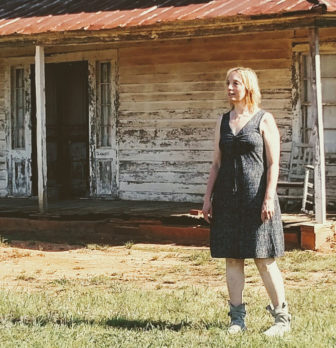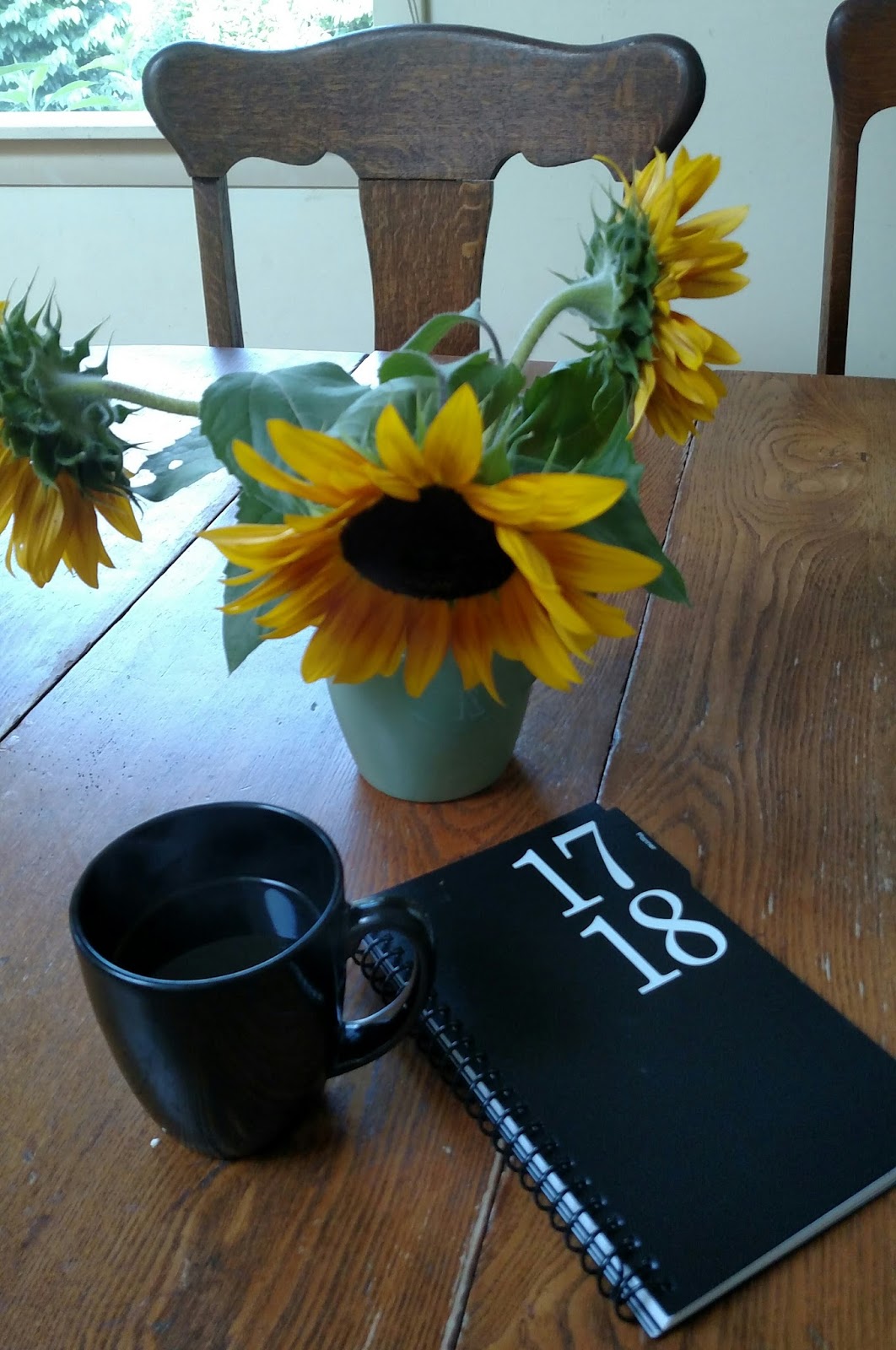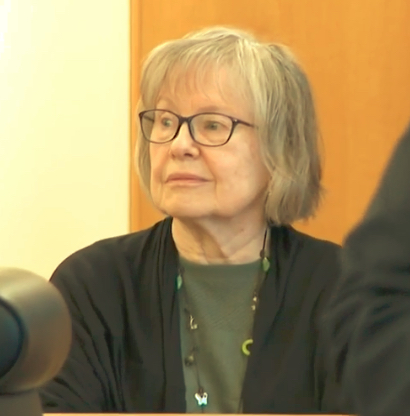By Carolyn Hutton
On Living in the In Between
In the last post, I was thinking about the natural state of chaos. (as an aside: now, in this empty nest house when I remember over the years the explosion of legos and playmobile scattered around the house, the sand on the rug trucked in from children who played all day in the sand pile, the cat hair floating in air in beams of morning light, the backpacks spilling over with papers frantically searched through, I wish I had been more organized. But I also know the children grew up creative and healthy..just saying, to anyone who feels overwhelmed by chaos)

Carolyn Hutton is pictured at a home near where she grew up in North Carolina.
But having said that, I want to talk about order. Because my own cultural references are so often Bible stories, I will begin with one because I think it tells the truth and offers some idea about how to live when life is hard. There is a story of a woman named Hannah who wanted a child so much but she could not conceive.
Finally one day she took a long journey alone to the temple and knelt down and wept and prayed and begged for God to give her a child. And then, she stood up, wiped away her tears, anointed herself with oil and went back home. I think there is a lot of truth in that story. That you cry out to God, to the the Universe, with all the anguish in your soul…then you give thanks and then you go about your day. And you wait.
It’s the going about your day and waiting part that can be hard. And that is where having a structure to your day is life saving. To some degree, structure is imposed on a day anyway. You likely have a 9-5 job. You may have children to feed and get off to school, or you may be teaching them at home. You have to go to a doctor’s appointment. You have to cook. You have a sick loved one to care for. If it is cold you have to get up and close the windows or chop firewood or call the oil company.
But if you are worried sick about something or if you are dealing with feelings of hopelessness and meaninglessness, the spaces between obligations yawn like great dark caverns. One of the best things to do, as simple as it seems, is to buy a planner. If you are poor like me, you can find one for 2 bucks at the Dollar General (I love the Dollar General). If you have the money, go buy a beautiful or professional looking one at Staples or somewhere online. There is something a tiny bit spirit lifting about the act of shopping for a planner. You pick up a calendar and flip through its blank pages and some little stirring of possibility wakes up. Those pages are not lived yet.
And what do you do with it? Obviously, you write in obligations. Not forgetting things you are supposed to do goes a long way in helping with the “I’m worthless” feelings. But other than that, that planner represents your great privilege and responsibility for creating what happens in your life. Your day can start with crying and asking for help. That’s all right. That’s necessary. But then you have to get up. If you take the planner and write down ONE thing you will do every hour, that’s great. It does not have to be 9:00 scrub the scum off the bathtub 10:00 create a business plan 11:00 grade 20 essays. 12:00 can 8 quarts of tomatoes. It CAN be 9:00 wash the breakfast dishes. 10:00 feed the cat and watch her eat. 11:00 go walk to the mailbox. 12:00 take a nap.
In fact, my all time favorite to-do list is that of Wilbur the Pig in chapter 4 of Charlotte’s Web:
From eight to nine, Wilbur planned to take a nap
outdoors in the sun.
From nine to eleven he planned to dig a hole, or
trench, and possibly find something good to eat buried
in the dirt.
From eleven to twelve he planned to stand still and
watch flies on the boards, watch bees in the clover, and
watch swallows in the air.
Twelve o’clock-lunchtime. Middlings, warm
water, apple parings, meat gravy, carrot scrapings, meat
scraps, stale hominy, and the wrapper off a package of
cheese. Lunch would be over at one.
From one to two, Wilbur planned to sleep.
From two to three, he planned to scratch itchy places
by rubbing against the fence.
From three to four, he planned to stand perfectly
still and think of what it was like to be alive, and to
wait for Fern…. (EB White)
There is a great deal more to learn about life from Wilbur the Pig, but having a plan orders you life, creates a predictability in the middle of uncertainty.
I want to tell another story though, not about Wilbur, but about a farm woman named Lillian Cronk who lived in Houghton, New York, in the late 1800s. I know about her because years ago my mother-in-law Ruth Hutton found this woman’s diary in an old house they were renovating and gave it to me to read.
Lillian was an upright Methodist, hard-working, devout and steadfast in her cryptic journaling which always began with the date and the weather and the chores she set out to do that day.. Monday was wash day, Tuesday ironing, Wednesday baking, and so on, an order every other American pioneer woman established for sheer survival.
In the pages of the year 1888, Lillian lost her 3 month old baby to pneumonia. One March entry reads “March 8, 1888. snowed and blowed. We buried my darling Agnes today.” The next day and the next and the next, Lillian begins her entry with the weather and with the chores she had to do, with the horse that was struggling with birthing, and so on.
Life must have been agony for her — having a baby, watching that tiny child succumb to disease, being wild with fear and then grief and having to go on, having to get up and build a fire in the cookstove, boil water for washing clothes, prepare the fields for planting, bake bread.
It is not a bad thing to wander around in an old cemetery for just a little while (it’s kind of my thing, I guess) and look at those gravestones and think about those people — there were few parents before the turn of the last century who did not bury a child. How hard their daily life was and no matter what terrible thing happened to them they had to keep going simply to survive.
Thank God we are not there, not them, and I don’t at all mean to say “You think you have it hard…” What I do mean to say is that in those days, the necessity of an ordered day was a survival strategy—not just for putting food on the table, but for getting through emotional distress.
Lillian and all of the women like her had to keep going somehow. For Lillian, I believe that the structure created through writing the journal (a kind of planner, too) helped her get through.
So, buy a planner. Look at the blank hours and fill them up with something, even small things. Let your first task be to ask for help for the day.
Let your last task be to give thanks for the day (I will talk about this in another blog—there is a lot of great writing out there about this). And in between, like Hannah from the Bible story, go about your day and wait for help. Keep walking.
Caroyln Hutton is an English teacher. When she was in 5th grade, she read “Harriet the Spy” and loved Harriet so much that she started keeping a notebook that got her into as much trouble as it got Harriet in because she always told the truth in her notebooks. But she never stopped writing. A native of North Carolina, Carolyn is also a musician and plays bluegrass and old time music with Drowned Valley and the duo Long Journey. She lives with her husband, Rod, in Madbury where their four grown children sometimes visit.




